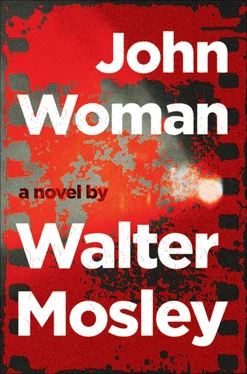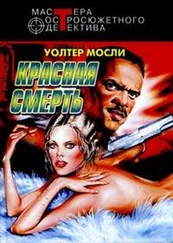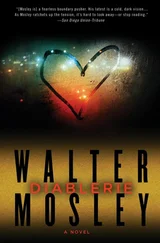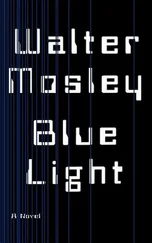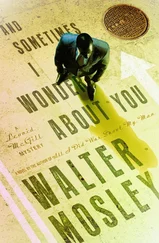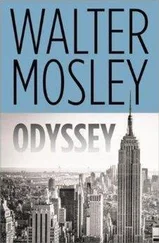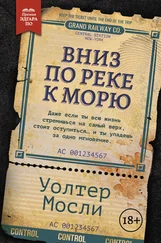“But mom couldn’t be in Mississippi, dad,” Cornelius argued. “You didn’t meet her until she came to your projection room running from Jimmy Grimaldi.”
“Oh,” Herman said. “Oh yeah, I mean yes. Yes it was not your mother but my mother. Yes my mother...”
Every day Cornelius discussed and argued about the bearded white man dressed in black, or sometimes the black man, who he was following through the Mississippi pinewoods. He passed the scenes of lynchings and rapes, patches of strawberries and young Abraham Lincoln sitting by a brook. Once he came upon Thucydides. This, Cornelius knew, was a turning point for his father. In the journey through his mind he had come across the historian he loved most. The ancient Greek doctor-general was the signpost of Herman’s sanity.
Along the way child-Herman had gone by a bevy of naked white women dancing in a circle. When the black man (he was a Negro at that moment) moved on the women tried to stop Herman, but he shook them off following the trail of breadcrumbs the man had left to find his own way back home.
Herman ate the breadcrumbs. That’s how he stayed alive: eating breadcrumbs, trailing the white man in black, the black man.
“... yes it was my mother there with me. Your mother was not there. My mother said I should go home and I told her, ‘Later, mama. I got to find out where this man be goin’ to first.’
“And one day, instead of a breadcrumb he tore out a page from a dictionary, leaving that to mark his path. I picked it up and put it in my mouth because I knew paper was made from wood and a man could eat wood if he was hungry enough.”
“So you were following the man and eating pages from his dictionary?” Cornelius asked.
“I almost did,” Herman said. “I almost did but then, before I chewed, I took the page out from my mouth and looked at it. It was all chicken scratches, black marks on yellow paper. But the more I looked, the more it seemed to make sense. They closed all the black schools down around me. They said black folks would do better in the cotton fields and the fruit farms than they would in no classroom. You couldn’t read if you was black. Why read if there was cotton to be pult? Why read when you could slave?”
Herman’s eyes opened wide in amazement. He gazed at the ceiling trying to glean an answer from above.
By day six Cornelius had gotten Herman to sit up as he used to do at home. CC had deciphered the doctor’s scrawls on the medical charts, changing the morphine prescribed to ibuprofen and removing the Ritalin altogether.
He made these changes after the doctor’s rounds.
Every day Cornelius would remind his father where the story had left off. At first Herman claimed not to remember but Cornelius kept asking and after a while he’d have Herman back on the trail of the quarry in black.
“... the pages was from a dictionary at first but then they was from novels and history books and biographies. I strained so hard to understand. Some people along the way give me hints. There was a white woman on the other side of a river he crossed who told me what a ‘Q’ was. She told me that there was no ‘Q’ word that didn’t have a ‘U’ as the second letter. She was wrong but that didn’t matter because she was mostly right....”
“Why were you following that man, dad?”
“To find my way back home,” he said.
“But you were with your mother. Didn’t she know the way home?”
“Not home to Mississippi, ninny. I wanted to come home to you.”
“Who am I?”
“My son... Cornelius.”
And he was back in the world they both inhabited.
“We have to get you out of here, dad. They want to put you into a nursing home.”
“What do we do about it, son?”
Wednesday afternoon at three p.m. Herman Jones, using two bamboo canes, walked toward the nurses’ desk on the third floor of St. Francis Hospital in Brooklyn. Cornelius was by his side. The elder Jones was wearing blue jeans, a red T-shirt and hospital-supplied paper slippers. The day before they had practiced their trek. It was difficult at first but Herman was resolute and so was his son.
“Where you think you goin’?” a big black nurse with blond hair asked.
She rose up from behind the nurses’ station.
“Home,” Cornelius said.
“I don’t have authorization to discharge this patient. Come on now, Mr. Jones, let me take you back to your room.”
“No, Nurse, I am not going back there.”
“But Mr.—”
“Please,” Herman said. “I do not wish to be transferred to some nursing facility. I can move under my own power and I have the wherewithal to address your inquiries. That accepted, there is no reason for you to hinder my egress from this, this medical prison.”
“The doctor has to release you, Mr. Jones.”
“What is your name?” Herman asked the nurse.
“Jackie.”
“Jackie what?”
“Boughman.”
“Well, Ms. Boughman,” Herman said. “I take it you are a black woman in spite of your hair.”
“Yeah.”
“Being of our race you must be aware of the end of slavery in the United States. And so you must understand why I elect to leave these premises under my own power.”
Cornelius had never been more proud of his father. He knew how hard it was for him just to stand after being in bed for so long and with a new hip aching in its joint. But Herman was eloquent and dignified.
“I’m sorry, Mr. Jones, but I will have to wait for the doctor’s release form.”
“Excuse me,” a voice said then.
All three heads turned to see a caramel-colored woman who had approached unnoticed.
Only Cornelius recognized Colette Margolis.
“Yes?” Nurse Boughman said.
“I’m a family friend,” Colette said, flipping open her wallet to reveal the shiny detective’s badge. “I’ve come to help Mr. Jones home.”
“I’m sorry but you’ll have to wait for the doctor,” the nurse repeated.
“No I don’t,” Colette asserted. “We’re leaving now. If you try to physically hinder me I am authorized to use force.”
“Even if you do not remember slavery I wager you understand that,” Herman said.
They took the elevator down and walked out to the street. There Colette’s lime green Honda was waiting for them. They helped Herman into the front seat.
“Who was that woman?” Herman asked Cornelius once he was back in his own bed.
“Just a friend.”
Cornelius had walked Colette to the door, where she kissed him then looked into his eyes as if maybe he was someone new.
“Where did you meet her?”
“Um,” the boy mumbled, “at the Arbuckle.”
“Is she one of the detectives investigating the disappearance of Chapman Lorraine? They suspect he’s been murdered.”
“How did you know about that?”
“France told me. About a month ago the police called him down to their offices. They told him that the last thing Chapman intended to do before his disappearance was come to the Arbuckle. He was such an awful human being, but still no man deserves to be plucked from his life.”
“Yeah,” Cornelius said heavily, feeling his father’s indictment. “I’m sorry France told you about it.”
“Why?”
“I don’t want you to worry.”
“Worry? Me? You can tell me anything, boy. I am your father not your ward. But answer my question, why would the police help me?”
“The detective questioned me too. She figured out about you and when I told her about your, um, predicament, she just offered to help.”
“That was very kind,” Herman said, looking his son in the eye.
“Dad?”
“Yes, son?”
“You seem... I mean for the past few months, before you fell, you were forgetting things.”
Читать дальше
